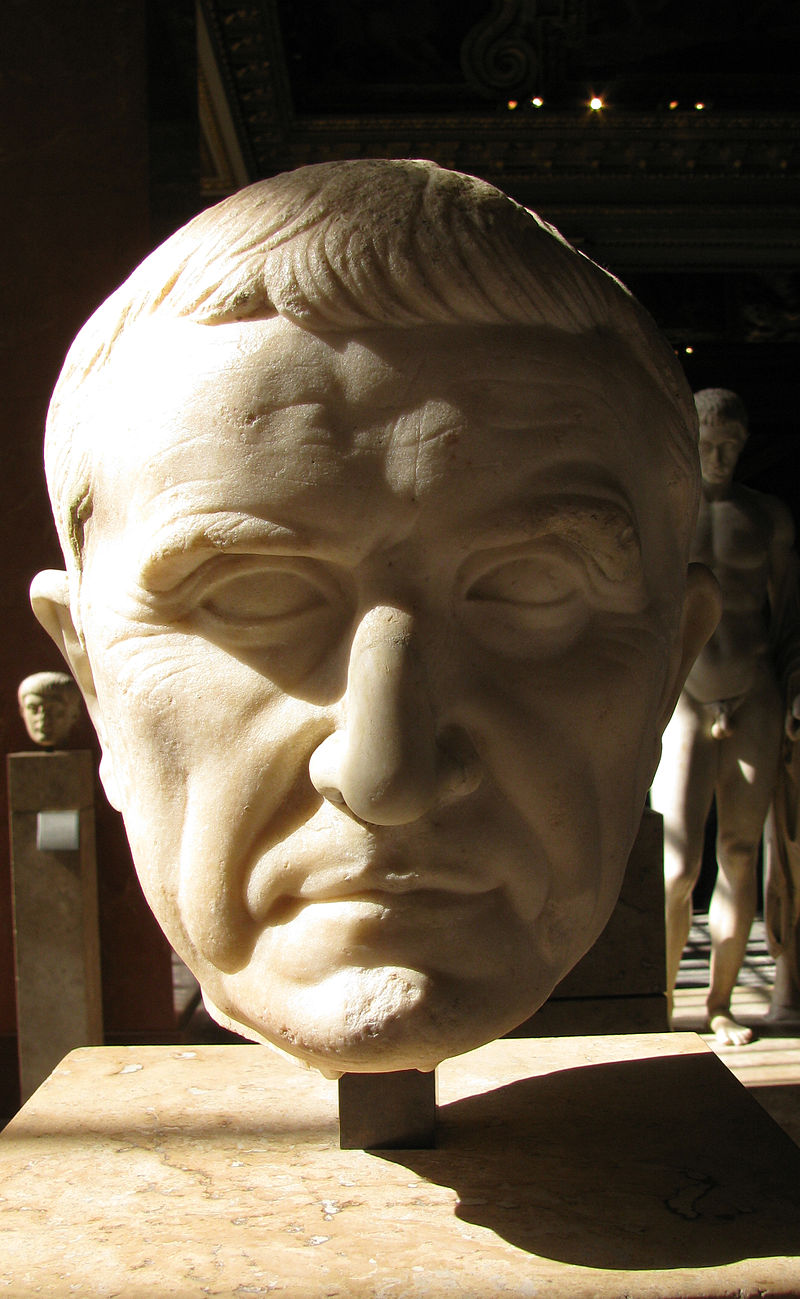Marcus Licinius Crassus
An extremely wealthy politician, always hungry for the one thing he couldn’t buy: military glory. He defeated Spartacus in 71BCE and subsequently won the consulship.
 Marcus Licinius Crassus was the son of the eminent senator, Publius Licinius Crassus. During Cinna’s proscriptions, Crassus fled to Hispania. After
Cinna’s death, he then went to Africa, where
Sulla’s supporters were gathering. When Sulla returned after the end of the First Mithridatic War, he marched on Rome with Sulla. During Sulla’s proscriptions, Crassus made much of his money, eventually becoming the richest individual the Roman world had ever seen. Plutarch reports that he earned most of his money “by fire and rapine, making his advantage of public calamities.” While some of his wealth was acquired through the slave trade, production from silver mines, and real estate purchases, he also is said to have acquired wealth from less honorable means. For example, when buildings would burn, Crassus would make an offer on the land for a price that benefitted him.
Marcus Licinius Crassus was the son of the eminent senator, Publius Licinius Crassus. During Cinna’s proscriptions, Crassus fled to Hispania. After
Cinna’s death, he then went to Africa, where
Sulla’s supporters were gathering. When Sulla returned after the end of the First Mithridatic War, he marched on Rome with Sulla. During Sulla’s proscriptions, Crassus made much of his money, eventually becoming the richest individual the Roman world had ever seen. Plutarch reports that he earned most of his money “by fire and rapine, making his advantage of public calamities.” While some of his wealth was acquired through the slave trade, production from silver mines, and real estate purchases, he also is said to have acquired wealth from less honorable means. For example, when buildings would burn, Crassus would make an offer on the land for a price that benefitted him.
Crassus also worked to further his political career. Despite his wealth, his military successes, and his family, he was continually overshadowed by Pompey the Great. Regardless, he still gradually ascended the cursus honorum. Crassus was particularly helpful during the Third Servile War, led by Spartacus. At first his soldiers were hesitant, until Crassus revived the practice of decimation, in which one out of every ten men were killed. The troops rallied when they realized that Crassus was “more dangerous to them than the enemy.” It was at the Battle of Siler River in 71 BCE that Crassus captured some 6,000 rebellious slaves alive. These slaves were crucified along the Via Appia as a lesson to any future rebels. However, Pompey received the credit for arriving at the very end of the war. Therefore, Crassus received an ovation, which was an honor far less than a triumph. In part because of this victory, Crassus was elected consul for 70BCE with Pompey. During this year, he demonstrated his wealth with great public sacrifices to Hercules.
In 65 BCE, he was elected censor, and during this time, he acted as a patron to Julius Caesar as he supported Caesar’s election to the position of Pontifex Maximus or chief priest as well as Caesar’s efforts to become commander of prominent military campaigns such as his campaign in Gaul. Crassus also played a role as the third triumvir in the triumvirate formed with Gnaeus Pompeius. This alliance was solidified in 55 BCE at the Lucca Conference. Crassus was named consul with Pompey; Crassus was named governor of Syria and Pompey the governor of Hispania.
While in Syria, he crossed the Euphrates River and attempted to conquer Parthia, which was a country of great riches. He also, however, wished to match Pompey and Caesar in terms of military eminence. In 53 BCE, his forces were defeated at Carrhae. His forces, near mutiny, demanded that he meet with the Parthians and reach a peace agreement. After an agreement had been made, however, there was a mild disagreement that turned into a fully fledged battle that left Crassus and his soldiers dead. A story later emerged that the Parthians poured molten gold into his mouth as a sign of his greed. In this battle, the Parthians also captured the legionary battle standards of Crassus, a huge moral defeat and terrible omen for the Romans.
→ Attalus Entry: M. Licinius Crassus17
→ Smith Entry
→ Wikipedia Entry